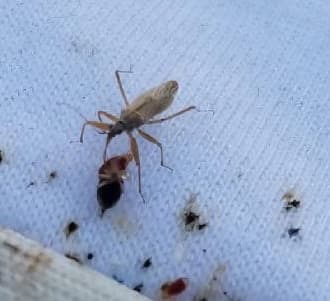Natural alternatives to the bed bug exterminator: what eats bed bugs?
by Tommy Underhill
August 4, 2021
This past week I wrote about the myth that earwigs eat bed bugs. In short, earwigs will not make a suitable natural alternative to the bed bug exterminator.
If not earwigs, what could we turn to instead of a trusted and professional bed bug exterminator or self-treating with heat?
Assassin bugs
 Assassin bugs are a group of insects with long mouthparts used to pierce and suck the life fluids out of other insects.
Assassin bugs are a group of insects with long mouthparts used to pierce and suck the life fluids out of other insects.
I have a great photo of an assassin bug hunting bed bugs on a mattress.
One specific assassin bug is the masked hunter. Juvenile masked hunter bugs cover themselves with dust and sand as camouflage, and commonly inhabit homes as a hunting ground.
Of all the predators on this list, this is one of the most commonly talked about natural predators of bedbugs. Though they do eat bedbugs regularly and likely evolved to eat bedbugs and their relatives, there is no evidence that you can use masked hunter bugs to eradicate an infestation.
Assassin bugs in your home can be an ominous omen. Lots of masked hunters inside your home is an indicator of a steady food source. You may want to check for bedbugs if you start finding them.
Ants
 Regardless of size, ants eat about every other insect they can find. Theoretically— and I stress this is only a thought experiment!— if you move an ant colony into your bedroom you will certainly eliminate the bedbugs. In fact, ants like pharaoh ants are almost obligate insectivores which feed on other species of ants and other small insects— like bed bugs and their eggs.
Regardless of size, ants eat about every other insect they can find. Theoretically— and I stress this is only a thought experiment!— if you move an ant colony into your bedroom you will certainly eliminate the bedbugs. In fact, ants like pharaoh ants are almost obligate insectivores which feed on other species of ants and other small insects— like bed bugs and their eggs.
The problem presents itself when the ants successfully eliminate your bed bug infestation— and they will— and run out of food, they will start trying to eat any other source of food they can find. This could mean you if you are the only thing in the room.
Squishing a few ants is generally a pretty straightforward proposition. An entire ant colony often consists of thousands to tens of thousands of insects. While you can certainly take on a single ant, an entire colony is a challenge even for the most experienced pest eradicator. So, we don’t recommend flooding your room with ants.
Cockroaches
 Most exterminators will find this self-evident: cockroaches will eat anything. Unfortunately, sites on the internet that claim cockroaches are “natural bedbug predators” are propagating a fair bit of myth. While a cockroach will readily eat bed bugs and bedbug eggs if they happen upon them, there is no empirical evidence that cockroaches readily seek out bedbugs to feed upon. Cockroaches are well-known to be scavengers— essentially seeking the easiest food source available.
Most exterminators will find this self-evident: cockroaches will eat anything. Unfortunately, sites on the internet that claim cockroaches are “natural bedbug predators” are propagating a fair bit of myth. While a cockroach will readily eat bed bugs and bedbug eggs if they happen upon them, there is no empirical evidence that cockroaches readily seek out bedbugs to feed upon. Cockroaches are well-known to be scavengers— essentially seeking the easiest food source available.
As I’ve written before, cockroaches survive on garbage, dead plant matter, and all sorts of other food that are much easier to scavenge around the typical household. Furthermore, cockroaches prefer to inhabit a moist environment, such as those found under sinks, in bathrooms, or around leaking faucets. In a dry bedroom, a cockroach may quickly dehydrate and die. So, cockroaches are not really bedbug predators even if they do sometimes opportunistically consume a bedbug or two.
Centipedes
 Centipedes are voracious predators, preying on many different types of insects. Centipedes are not a fun natural alternative to a bed bug exterminator for your bed bug infestation because their bite can leave you with a nasty welt and may be worse than the bedbugs themselves.
Centipedes are voracious predators, preying on many different types of insects. Centipedes are not a fun natural alternative to a bed bug exterminator for your bed bug infestation because their bite can leave you with a nasty welt and may be worse than the bedbugs themselves.
Centipedes have a natural aversion to places humans frequent— where they would most likely be squished, sprayed, and killed by us! So, it’s highly unlikely that centipedes would be useful to control bedbug populations in any meaningful way.
Moths
 Most folks would believe a moth feasting on bed bugs to be a myth as grand as The Moth Man. Even though 99.9% of moth species have absolutely no interest in bedbugs, there is one species that has been shown to eat both bed bugs and their eggs. Pyralis pictalis, commonly referred to as the painted meal moth, has demonstrated an affinity to seek out and eat bed bug eggs. Apparently, when these moth larvae run out of their normal food (such as grains and dried cereals), they turn to about anything else they can find.
Most folks would believe a moth feasting on bed bugs to be a myth as grand as The Moth Man. Even though 99.9% of moth species have absolutely no interest in bedbugs, there is one species that has been shown to eat both bed bugs and their eggs. Pyralis pictalis, commonly referred to as the painted meal moth, has demonstrated an affinity to seek out and eat bed bug eggs. Apparently, when these moth larvae run out of their normal food (such as grains and dried cereals), they turn to about anything else they can find.
Surprisingly, these little insects could constitute a natural alternative to the bed bug exterminator— the process just hasn’t been explored in a university setting.
Spiders
 The ability and propensity of spiders to hunt and feed on bed bugs depends entirely on the spider’s size and method of hunting. Tiny spiders are often too small to eat bed bugs, while larger spiders may ignore bed bugs completely in favor of larger prey. Many species of spiders (such as wolf spiders, crab walking spiders, and jumping spiders) can be the right size to eat bed bugs and prowl the ground for prey, they are not necessarily something you would want to cohabitate with. Almost all spider species can and will bite, and most spider bites are more painful and itchy than bedbug bites.
The ability and propensity of spiders to hunt and feed on bed bugs depends entirely on the spider’s size and method of hunting. Tiny spiders are often too small to eat bed bugs, while larger spiders may ignore bed bugs completely in favor of larger prey. Many species of spiders (such as wolf spiders, crab walking spiders, and jumping spiders) can be the right size to eat bed bugs and prowl the ground for prey, they are not necessarily something you would want to cohabitate with. Almost all spider species can and will bite, and most spider bites are more painful and itchy than bedbug bites.
One species of spider has been scientifically proven to be a potential alternative to a bed bug exterminator! The species Thanatus flavidus is native to Eastern Europe that is the perfect size for hunting bed bugs. T. flavidus is not a web spinner. Instead, these spiders hunt on the ground for prey. Unfortunately, it would take somewhere between 20-40 spiders per room to eliminate an average bed bug infestation.
Mites
 Common house mites, usually known as dust mites, are natural-born enemies to bed bugs. The two insects have waged war for as long as they have shared our spaces. We find bed bugs and mites in our same ecosystem: typically in sheets and duvets. Luckily for us, there’s lots of proof that mites feed on bed bugs.
Common house mites, usually known as dust mites, are natural-born enemies to bed bugs. The two insects have waged war for as long as they have shared our spaces. We find bed bugs and mites in our same ecosystem: typically in sheets and duvets. Luckily for us, there’s lots of proof that mites feed on bed bugs.
For good or for bad, there’s not really much you can do to get rid of mites. Every single home and hotel in the world, no matter the neighborhood or cleanliness, has dust mites of one species or another. They’re there, feeding on your dander and your bed bugs.
Geckos and other lizards
 Contrary to popular belief, there is little empirical evidence that lizards naturally prey on bed bugs. Some people claim that lizards and frogs will eat bed bugs, and I’m sure they would if that is all we dropped into their cages. Most lizards prefer larger insects like crickets or moths, finding bed bugs to be too small and not worth the energy and effort. Furthermore, geckos often hunt on walls where bed bugs are not usually found.
Contrary to popular belief, there is little empirical evidence that lizards naturally prey on bed bugs. Some people claim that lizards and frogs will eat bed bugs, and I’m sure they would if that is all we dropped into their cages. Most lizards prefer larger insects like crickets or moths, finding bed bugs to be too small and not worth the energy and effort. Furthermore, geckos often hunt on walls where bed bugs are not usually found.
I would be very surprised if geckos or lizards would be a suitable alternative to a bed bug exterminator.
Bed bug heat equipment is more effective
I do not recommend introducing predatory insects or geckos into your home to deal with a bed bug infestation. There is a safe technology with years of proof from millions of successful bed bug treatments: GreenTech Heat equipment. We were the first company to commercialize heat for the extermination of insects and wrote the book on bed bug heat treatments.
For pest control operators, property management, university dorms, housing authorities, senior housing, restaurants, airlines, and apartment owners, GreenTech Heat technology is 100% effective for bed bugs, cockroaches, and all other insects. Heat is an effective tool to drive market share, increase profits, and improve customer satisfaction. Our certified training lets you do it right and do it safely the first time, reducing call-backs. Heat safely kills insects and microbes everywhere they may be found in a single one-day treatment. Call us at 888-699-3944. We have bed bug heaters for sale to get started with heat today.



